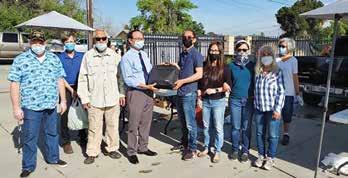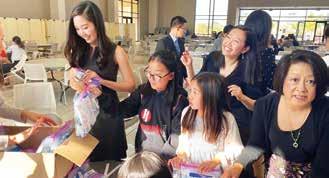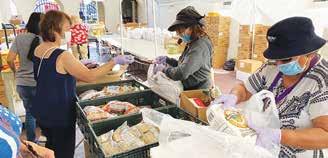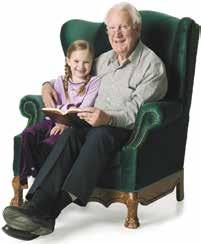
9 minute read
Caring for Real Problems in a Real World
By Jorge Soria
The past year has been hard for everyone; however, God is with us and never abandons His children during times of confusion, uncertainty, sickness, and death. Jesus' first sermon is recorded in Luke 4. The Gospel writer tells us that Jesus came to Nazareth and entered the synagogue on Sabbath, as was His custom. The scroll of the prophet Isaiah was handed to Him, and He read the prophecy from Isaiah 61:1-2. The way I see it, He chose these verses to be a mission statement for His ministry. “The Spirit of the Lord is upon Me, Because He has anointed Me To preach the gospel to the poor; He has sent Me to heal the brokenhearted, To proclaim liberty to the captives
And recovery of sight to the blind, To set at liberty those who are oppressed; To proclaim the acceptable year of the Lord” (Luke 4:18-19, NKJV). The original language is very clear. The poor refers to economically impoverished people. The blind refers to people with physical disabilities. The oppressed are people who are mistreated or persecuted. In other words, Christ's mission statement relates to real, practical problems in this world. And we have been called to minister to the people that Jesus came to serve. Our ministry is the people in the community—any place where we mingle with humanity.
We praise God that thousands of families have been blessed by the ministry of our church members who provide food, clothing, and other necessities. Some people in need have even been helped with rental assistance to get through one more month or, sadly, funeral expenses for loved ones. Allow me to share a few stories of mission-driven service that is happening in some of the Asian-Pacific, Black, and Hispanic churches in the Pacific Union Conference.
Warming hearts and bodies
In Sacramento, California, the Capitol City church helped keep their community warm by opening their doors as a warming center during the cold winter months. The church was approached by the city to help meet this need for the homeless community. For a month and half during the coldest months, Capitol City church was one of only three other centers open on a nightly basis, providing people in need with a place to sleep, a warm meal, as well as some basic health services. The center drew people from across the city— and a few came directly to the church after being discharged from the hospital.
According to Damian Chandler, senior pastor, a city council member stated at a press conference how surprised he was at how quickly the church stepped in to help. In an ABC 10 Sacramento news article dated February 24, 2021, City Councilmember Eric Guerra is quoted as saying, “This isn't a solution to addressing the long-term issue of homelessness, but it does save lives if done in every part of the city.” Chandler said that over a three-month period, the church served approximately 40 unique people, with some coming back multiple times.
Let’s give it a shot
On April 2, 2021, the 16th Street church in San Bernardino, California, held a COVID vaccination clinic for the local community. The church is located in San Bernardino’s Westside, a longtime socioeconomically disadvantaged community. According to an April 2 article in the San Bernardino Sun newspaper, “areas such as the Westside have been among the hardest hit by the pandemic.” Citing the California Department of Public Health, the article states that areas such as these have a death rate 6% higher for Blacks, 22% higher for Latinos, and 37% higher for communities with a median annual income below $40,000. The 16th Street church, in partnership with other community organizations, wanted to be a part of the solution by opening as a free vaccination site. The clinic drew local elected officials and leaders, as well as California Governor Gavin Newsom, who visited the site and chatted with community members. According to Andrea King, senior pastor, the 16th Street church was one of several churches across the state that were provided with some of the 25,000 vaccines from the state of California. According to King, during Newsom’s visit, the governor also asked questions, including about vaccine hesitancy. “I think he really enjoyed talking with people, and people enjoyed talking to him” King said. “It was a really down-to-earth time.” Over 300 people were vaccinated on April 2. The church also provides free COVID testing twice a week.
“Our churches have made a tremendous contribution to their communities, and it has helped them practice true Christianity,” said Virgil Childs, director of African American Ministries, of these and many other Black churches in the Pacific Union who have been actively engaged in community service during the pandemic. “That’s a way to be ambassadors for Christ. The strong ought to bear the burdens of the weak, as the Bible says, and we do that through service and making ourselves available to those in need.”
16th Street church in San Bernardino

Inland Empire Filipino church Loma Linda Korean church

More than food
The Pacific Asian church communities in the Inland Empire region of California have also been actively serving in their local communities during the last year. Well before the pandemic, the Inland Empire Filipino church (IEF) had been actively involved in a weekly meal ministry for the homeless. They served approximately 70 people per week. The meals were prepared by volunteers from the church. When COVID hit, however, it was no longer possible to provide hot meals. Through a partnership with a local anti-hunger organization, however, IEF Community Services was able to provide food boxes to 200 to 300 families on a weekly basis. At the Loma Linda Korean church, food drives hosted by the outreach department help provide meals for homeless and low-income families, especially those who had lost jobs due to the pandemic. The church also hosted a blanket drive and, with the active engagement of young people in the congregation, created hygiene kits for the homeless. Part of the homeless outreach also included food bags with fruit, water, granola bars, and Bible verses for encouragement. The church has also ministered to local law enforcement by delivering meals to the San Bernardino Police Department. "How can the community feel Jesus’ touch of love through the church?" This is the question the Thai church in Redlands, California, started to ask itself in order to better serve others. Part of the answer resulted in initiating an outreach through food distribution. The first distribution event began in November 2020, with only 10 boxes containing three days’ worth of produce and dairy. By March 2021, the ministry was providing over 100 food boxes twice a week, including 600 to 1,800 pounds of fruits and vegetables.
Apart from the weekly food distribution, the church also started a “Sanctified DoorDash” project in which church members and volunteers deliver food to the people in their community who cannot make it to the food distribution. The ministry has made an impact not just in meeting physical needs but also spiritual needs and social connection. There are new people attending church services, including a Buddhist, and several non-Adventist community members have become food ministry volunteers. “The Asian-Pacific Ministry in the Pacific Union was not in a lockdown or quarantine mode during the pandemic,” said VicLouis Arreola, director of Asian-Pacific Ministries. “Doors were opened for service, and all our Asian churches were in active community service mode. There is no higher calling than service to humanity. To work for this common good is the greatest act.”

Thai church in Redlands
Celebrating service
In spring 2021, the Anaheim Spanish church celebrated a rather bittersweet one-year anniversary of their community drive-through food pantry ministry. Bitter because of the life-altering pandemic no one asked for that turned the world upside down, but even sweeter in the ways that God has moved through church members in sharing His love with their community through service. Initially, the drivethrough food pantry was serving 30 to 40 families per month, including church members, and it had about four volunteers. Fast forward to today, when the church now serves over 500 families per month, including those in the community and in the congregation, due in part to partnerships with local food banks and other organizations. Through these partnerships and over 20 volunteers, many of them youth and young adults from the church, Anaheim Spanish has been providing food, baby care, toiletries, and even personal protective equipment.
But beyond meeting physical needs, the church is also focused on providing spiritual care. Every Sabbath morning, people around the community start lining up in cars and on foot. Some of them arrive early to worship as they wait for the pantry to open up. Families have asked for prayers, Bibles, or materials to study at home.
As they conduct their outreach, the church has gotten to know some of the people they serve, such as the elderly woman who picks up food for her family because they are unable to do so, or the elderly gentleman who rides over on his bicycle to pick up food for his six grandchildren. Because of his age, he is unable to work, so he is thankful for the food and personal items that the church provides. Like others who have been blessed by the church’s ministry, he has spread the word in his neighborhood and brought others to the church to be fed, both physically and spiritually.
“Compassionate ministry is a biblical concept. Christ showed compassion to the less fortunate,” said Alberto Ingleton, director of Hispanic Ministries. “Following the example of Christ, our Hispanic churches have become relevant to their communities, and even to members of their own congregations most in need, during this difficult time. Food, clothing, and even financial assistance have been provided on a regular basis. This has provided much relief, and hope, to many families.”
Following Jesus’ example
Ellen G. White wrote, “Christ’s method alone will give true success in reaching the people. The Saviour mingled with men as one who desired their good. He showed His sympathy for them, ministered to their needs, and won their confidence. Then He bade them, ‘Follow Me’” (The Ministry of Healing, p. 143).
Jesus mingled with people because He loved them and because that was His mission. This is the way He helped and blessed countless lives. Then He extended an invitation to follow Him—and they followed Him. Unfortunately, because of this tragic disease called COVID-19, we have not been able to mingle with people as we usually do. But God continues to offer opportunities for us to minister using innovative programs, thus enabling us to do what Jesus asked us to do: carry out His mission of serving others. And now it’s my turn to ask: Are you ready to follow Jesus? As we serve others, following Jesus’ example, we’ll be living out His mission
_______________________________________ Jorge Soria is the vice president of the Pacific Union Conference.











